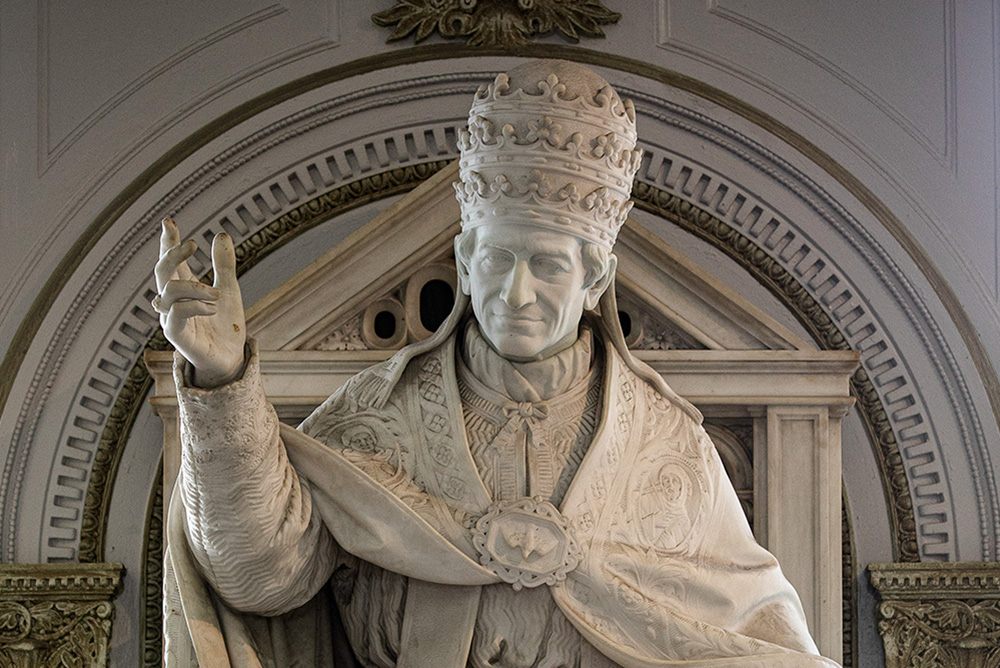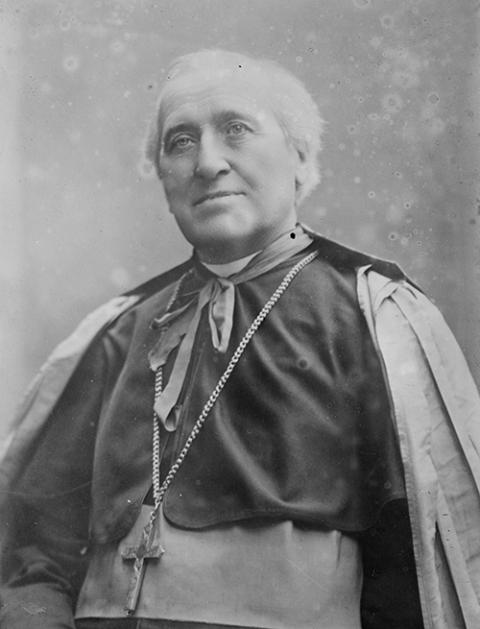
A statue of Pope Leo XIII is displayed at the Catholic University of America in Washington, D.C. (CNS/Tyler Orsburn)
In his article about the pope's letter to the U.S. bishops, my colleague Christopher White interviewed theology professor Massimo Faggioli who compared the current letter to Pope Leo XIII's 1899 letter Testem Benevolentiae Nostrae, which condemned the heresy of "Americanism."
"Right now this is something similar, but it's more interesting," Faggioli said. "Now Pope Francis is basically asking U.S. Catholics to remember what America is about. And that's an interesting twist of history."
Interesting indeed.
The roots of the controversy that led to Testem Benevolentiae are found not in the United States, but in Paris. Fr. Isaac Hecker, founder of the Paulists, died in 1888. An American biography of him was translated into French with a fulsome, and ideologically charged, introduction by Abbé Félix Klein.
"His preface transformed Hecker from a deeply spiritual American priest mediating Catholicism to Protestant America to the ideal type of the priest of the future, who harmonized the Church with modern science, who based his spirituality on the interior direction of the Holy Spirit, and who responded to the active virtues which produced the new saints of the marketplace rather than the passive virtues which produced monks and hermits," church historian Jesuit Fr. Gerald Fogarty observed.
The France of the 1890s was a period of increasing anti-Catholicism as successive governments limited the rights of the church, closing Catholic schools and eventually banning religious orders. Across the Rhine, the anti-Catholic Kulturkampf was the order of the day. Despite Leo's plea to French Catholics to rally to the republic, many Catholics became reactionary. In Klein's version of Hecker, the reactionaries saw an opportunity.
The conservative reaction to Klein, and through him, to Hecker, was led by Vincentian Fr. Charles Maignen, who published a series of articles that he collected into a volume titled Le Père Hecker est-il un saint? Maignen not only denounced Hecker, but also criticized prominent American prelates such as Archbishop John Ireland of St. Paul, Minnesota.

Archbishop John Ireland of St. Paul, Minnesota, in an undated photo (Library of Congress/George Grantham Bain Collection)
The cardinal of Paris refused to grant the book an imprimatur because of those criticisms, but Maignen received an imprimatur in Rome from the Master of the Sacred Palace, Dominican Fr. Albert Lepidi.
Testem Benevolentiae would end up mostly siding with the reactionaries, condemning Americanism as Maignen had described it. Just so, most American church leaders were able to deny any American actually held the condemned views. Americanism became known as "the phantom heresy."
This all might have remained a squabble among scholars had not prelates like Ireland been giving speeches in Europe extolling American ways, especially our separation of church and state.
In 1897, Ireland gave a major speech at the International Catholic Scientific Congress meeting in Fribourg. "However beautiful and true in theory may be the doctrine of the legal union of Church and State, in practice it has unfortunately been found but too often to work to the grave injury of the Church by diminishing her liberty, and giving to laymen sometimes possessed of little piety, the pretext for interfering in the administration of her affairs," Ireland told the group.
Remember that at this time, official teaching insisted on union of church and state whenever Catholics were in the majority, and only demanded religious liberty for Catholics when they were in the minority. This manifest double standard was justified on the grounds that Catholicism is the true church and "error has no rights."
European Catholics, including the popes, were skeptical of American-style liberalism because they could not distinguish it from liberalism's European variety. In Europe, liberalism was doctrinaire, anticlerical and often antireligious. America's adoption of religious liberty was different from Europe's. James Madison was not Voltaire: No Founding Father spat, "Écrasez l'Infame," at religion and religious sensibilities.
Anti-Catholicism in America was foundational and persistent, and there were times when it turned violent, but it was not usually virulent and it almost always lacked state sponsorship. In Europe, liberal regimes were as reactionary toward religion as religion was to liberalism. This ideological lens shaped Leo's views.
Another event intervened to turn the academic spat into a major problem. On Feb. 15, 1898, the battleship Maine blew up in Havana harbor. At the request of the Vatican secretary of state, Cardinal Mariano Rampolla, Ireland used his friendship with President William McKinley to plead for peace, but to no avail. The U.S. blockaded Cuba on April 21 and Spain declared war two days later. America was no longer merely an intellectual threat to the ancient regime. This geopolitical lens also shaped the pope's thoughts about the U.S.
Advertisement
A final, related and controlling factor shaped the papal court and Leo's decision to condemn Americanism: the Roman Question. In 1870, the forces of the Italian state captured Rome and the next year declared it the capital of the newly united country. The papal states were no more.
First Pius IX and later popes could not imagine how the papacy could maintain its independence without control over sovereign territory. They declared themselves "prisoners of the Vatican" and even refused to appear on the central loggia overlooking St Peter's piazza to offer blessings.
Leo's understanding of religion in America was beclouded by his understanding of sovereignty, freedom and religion, all wrapped up in the Roman Question.
History is filled with ironies, but this is one of the greatest: Losing the papal states turned out to be the best thing for the papacy. Popes and cardinals had been lousy civil administrators, and the need to police the papal states distracted them from their spiritual duties. They were never immune from wars and had to compromise with foreign powers repeatedly in order to retain control of central Italy.
Gallicanism, which sought to limit papal authority, had been a thorn in the side of Rome for centuries. Monarchs were accustomed to nominating bishops and even pastors, and the three great Catholic monarchs — the Holy Roman emperor, the king of Spain and the king of France — could veto the selection of a particular candidate for the papacy.
All that was brushed aside once the papacy was freed of the papal states. Still, in 1898, Leo and his advisers could not discern this future. He could not see that being freed from ideological, geopolitical and sovereign biases would permit him and his successors to focus on the church's teachings through the purifying lens of the Gospels. The church's profound teaching on the right ordering of society was freed from the distorting lenses of late 19th century's nontheological concerns.
None of us, including Pope Francis, is entirely free from the biases of our times. No pope has any special insight into the future. And one can argue that Francis and his advisers might not grasp the ideological and geopolitical landscape of the United States, although I think such an argument would be wrong.
What is undeniable is that Francis understands the responsibility of Catholics in the world today, and our responsibility to and for the world, through the lens offered by the Gospels. He is attuned to the dangers authoritarians pose to the church, to the vulnerable, to the peace of the societies they seek to dominate because they deny human dignity and reduce religion to a prop for their irreligious goals.
When Trump's border czar, Tom Homan, said of Francis' criticisms of mass deportations, "I wish he'd stick to the Catholic Church and fix that and leave border enforcement to us," he failed to realize the pope is sticking to the Catholic Church, and he is doing so in a way Pope Leo could not even imagine.







